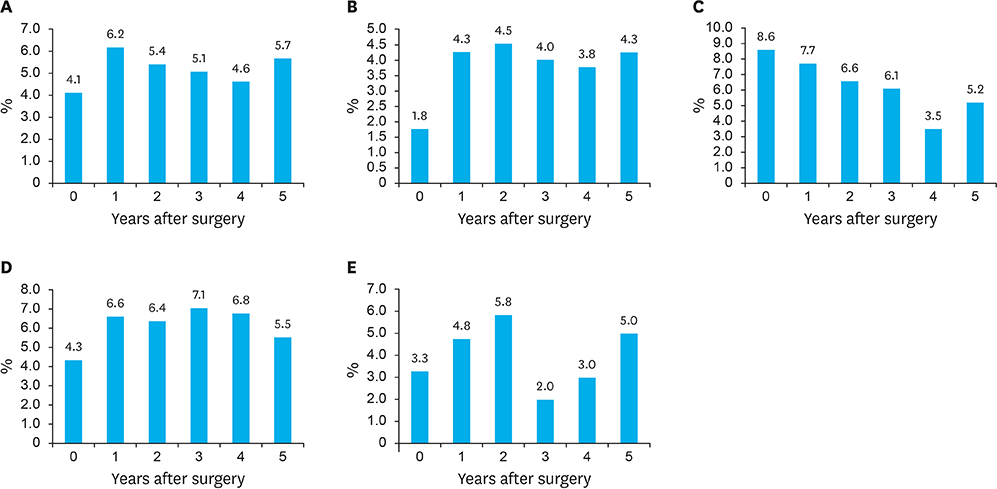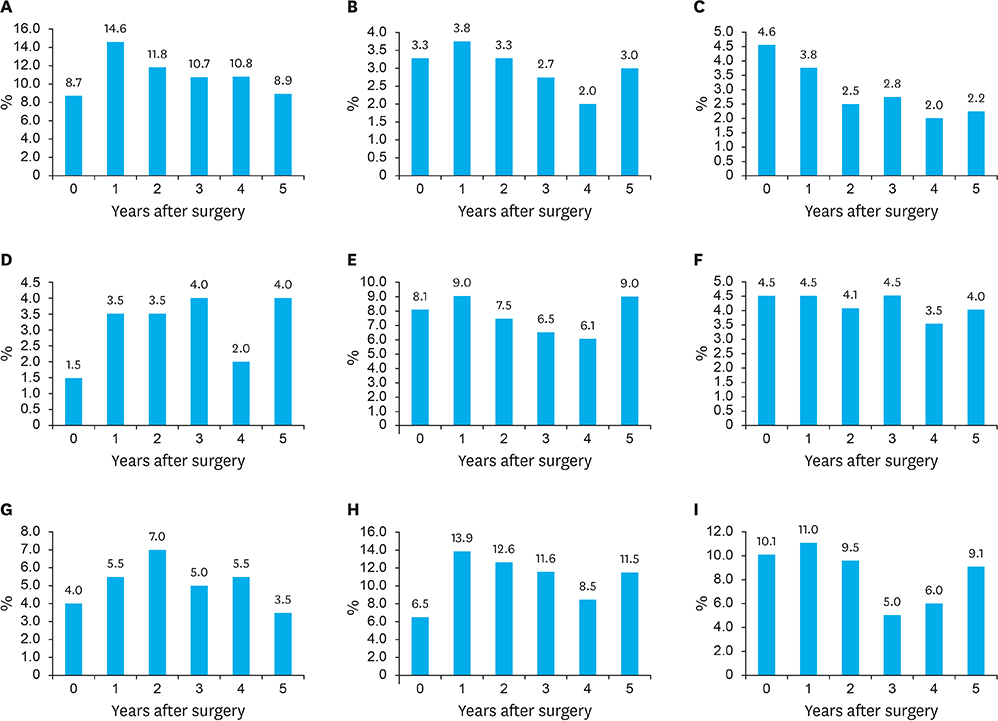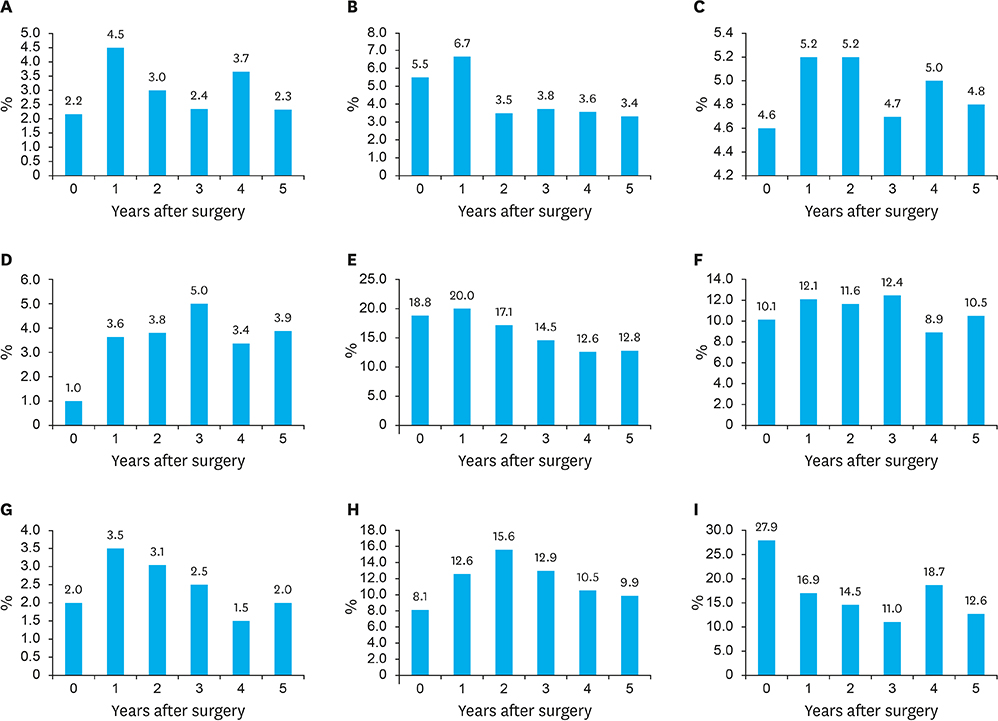J Gastric Cancer.
2017 Jun;17(2):110-119. 10.5230/jgc.2017.17.e14.
Chronological Changes in Quality of Life after Distal Gastrectomy for Gastric Cancer
- Affiliations
-
- 1Gastric Cancer Center, Kyungpook National University Medical Center, Daegu, Korea. wyu@knu.ac.kr
- 2Department of Surgery, Kyungpook National University Hospital, Daegu, Korea.
- KMID: 2383734
- DOI: http://doi.org/10.5230/jgc.2017.17.e14
Abstract
- PURPOSE
Patient quality of life (QoL) may be severely disrupted following distal gastrectomy for gastric cancer. This issue should be addressed to improve postoperative care.
MATERIALS AND METHODS
QoL data from the European Organization for Research and Treatment of Cancer Quality of Life Questionnaire, and its gastric cancer-specific module, were administered to 202 patients preoperatively, and 5 years postoperatively. Patients were classified into subgroups based on their answers to each questionnaire item: group I (good), answering "not at all"; group II (fair), answering "a little"; group III (poor), answering "quite a bit" or "very much."
RESULTS
At 5 years post-operation, the proportion of patients in group III on the functional scales ranged from 4.3% to 5.7%. The proportions of patients in group III with fatigue, insomnia, diarrhea, and financial difficulties were 8.9%, 9.0%, 11.5%, and 9.1%, respectively. The proportions of patients in group III with anxiety, dry mouth, body image concerns, and hair loss were 12.8%, 10.5%, 9.9%, and 12.6%, respectively. These proportions were less than 5% for other QoL symptom scales/items and for the gastric cancer-specific module.
CONCLUSIONS
Most patients reported good or fair QoL following surgery. However, symptom management of fatigue, insomnia, diarrhea, anxiety, dry mouth, body image, and hair loss should be specifically targeted for long-term patient care in approximately 10% of patients.
Keyword
MeSH Terms
Figure
Cited by 2 articles
-
Impact of body mass index on quality of life after distal gastrectomy for gastric cancer
Ki Bum Park, Byunghyuk Yu, Ji Yeon Park, Oh Kyoung Kwon, Wansik Yu
Ann Surg Treat Res. 2019;96(5):250-258. doi: 10.4174/astr.2019.96.5.250.Chronological changes in quality of life and body composition after gastrectomy for locally advanced gastric cancer
Ki Bum Park, Ji Yeon Park, Seung Soo Lee, Ho Young Chung, Oh Kyoung Kwon
Ann Surg Treat Res. 2020;98(5):262-269. doi: 10.4174/astr.2020.98.5.262.
Reference
-
1. Wu CW, Lo SS, Shen KH, Hsieh MC, Lui WY, P’eng FK. Surgical mortality, survival, and quality of life after resection for gastric cancer in the elderly. World J Surg. 2000; 24:465–472.2. Sakuramoto S, Sasako M, Yamaguchi T, Kinoshita T, Fujii M, Nashimoto A, et al. Adjuvant chemotherapy for gastric cancer with S-1, an oral fluoropyrimidine. N Engl J Med. 2007; 357:1810–1820.3. Lee SS, Chung HY, Yu W. Quality of life of long-term survivors after a distal subtotal gastrectomy. Cancer Res Treat. 2010; 42:130–134.4. Kim AR, Cho J, Hsu YJ, Choi MG, Noh JH, Sohn TS, et al. Changes of quality of life in gastric cancer patients after curative resection: a longitudinal cohort study in Korea. Ann Surg. 2012; 256:1008–1013.5. Karanicolas PJ, Graham D, Gönen M, Strong VE, Brennan MF, Coit DG. Quality of life after gastrectomy for adenocarcinoma: a prospective cohort study. Ann Surg. 2013; 257:1039–1046.6. Aaronson NK, Ahmedzai S, Bergman B, Bullinger M, Cull A, Duez NJ, et al. The European Organization for Research and Treatment of Cancer QLQ-C30: a quality-of-life instrument for use in international clinical trials in oncology. J Natl Cancer Inst. 1993; 85:365–376.7. Vickery CW, Blazeby JM, Conroy T, Arraras J, Sezer O, Koller M, et al. Development of an EORTC disease-specific quality of life module for use in patients with gastric cancer. Eur J Cancer. 2001; 37:966–971.8. Yun YH, Park YS, Lee ES, Bang SM, Heo DS, Park SY, et al. Validation of the Korean version of the EORTC QLQ-C30. Qual Life Res. 2004; 13:863–868.9. Lee SS, Chung HY, Kwon OK, Yu W. Quality of life in cancer survivors 5 years or more after total gastrectomy: a case-control study. Int J Surg. 2014; 12:700–705.10. Yu W, Park KB, Chung HY, Kwon OK, Lee SS. Chronological changes of quality of life in long-term survivors after gastrectomy for gastric cancer. Cancer Res Treat. 2016; 48:1030–1036.11. Lee SS, Chung HY, Kwon OK, Yu W. Long-term quality of life after distal subtotal and total gastrectomy: symptom- and behavior-oriented consequences. Ann Surg. 2016; 263:738–744.12. Bae JM, Kim S, Kim YW, Ryu KW, Lee JH, Noh JH, et al. Health-related quality of life among disease-free stomach cancer survivors in Korea. Qual Life Res. 2006; 15:1587–1596.13. Kim YW, Baik YH, Yun YH, Nam BH, Kim DH, Choi IJ, et al. Improved quality of life outcomes after laparoscopy-assisted distal gastrectomy for early gastric cancer: results of a prospective randomized clinical trial. Ann Surg. 2008; 248:721–727.14. Namikawa T, Oki T, Kitagawa H, Okabayashi T, Kobayashi M, Hanazaki K. Impact of jejunal pouch interposition reconstruction after proximal gastrectomy for early gastric cancer on quality of life: short- and long-term consequences. Am J Surg. 2012; 204:203–209.15. Park S, Chung HY, Lee SS, Kwon O, Yu W. Serial comparisons of quality of life after distal subtotal or total gastrectomy: what are the rational approaches for quality of life management? J Gastric Cancer. 2014; 14:32–38.16. Misawa K, Fujiwara M, Ando M, Ito S, Mochizuki Y, Ito Y, et al. Long-term quality of life after laparoscopic distal gastrectomy for early gastric cancer: results of a prospective multi-institutional comparative trial. Gastric Cancer. 2015; 18:417–425.17. Kobayashi D, Kodera Y, Fujiwara M, Koike M, Nakayama G, Nakao A. Assessment of quality of life after gastrectomy using EORTC QLQ-C30 and STO22. World J Surg. 2011; 35:357–364.18. Kong H, Kwon OK, Yu W. Changes of quality of life after gastric cancer surgery. J Gastric Cancer. 2012; 12:194–200.19. Park JY, Eom BW, Jo MJ, Yoon HM, Ryu KW, Kim YW, et al. Health-related quality of life after robot-assisted distal gastrectomy in early gastric cancer. World J Surg. 2014; 38:1112–1120.20. Lee SS, Chung HY, Kwon O, Yu W. Long-term shifting patterns in quality of life after distal subtotal gastrectomy: preoperative- and healthy-based interpretations. Ann Surg. 2015; 261:1131–1137.21. Stone P, Richards M, Hardy J. Fatigue in patients with cancer. Eur J Cancer. 1998; 34:1670–1676.22. Frank-Stromborg M, Wright P. Ambulatory cancer patients’ perception of the physical and psychosocial changes in their lives since the diagnosis of cancer. Cancer Nurs. 1984; 7:117–130.23. Fernsler J. A comparison of patient and nurse perceptions of patients’ self-care deficits associated with cancer chemotherapy. Cancer Nurs. 1986; 9:50–57.24. Rhodes VA, Watson PM, Hanson BM. Patients’ descriptions of the influence of tiredness and weakness on self-care abilities. Cancer Nurs. 1988; 11:186–194.25. Glaus A, Crow R, Hammond S. A qualitative study to explore the concept of fatigue/tiredness in cancer patients and in healthy individuals. Eur J Cancer Care (Engl). 1996; 5:8–23.26. Ream E, Richardson A. Fatigue in patients with cancer and chronic obstructive airways disease: a phenomenological enquiry. Int J Nurs Stud. 1997; 34:44–53.
- Full Text Links
- Actions
-
Cited
- CITED
-
- Close
- Share
- Similar articles
-
- Quality of life after total gastrectomy in the gastric cancer patients
- Laparoscopy-Assisted Distal Gastrectomy for Early Gastric Cancer in the Elderly
- Serial Comparisons of Quality of Life after Distal Subtotal or Total Gastrectomy: What Are the Rational Approaches for Quality of Life Management?
- Recent advances in minimally invasive surgery for gastric cancer
- Quality of Life of Long-term Survivors after a Subtotal or a Total Gastrectomy for Gastric Cancer





